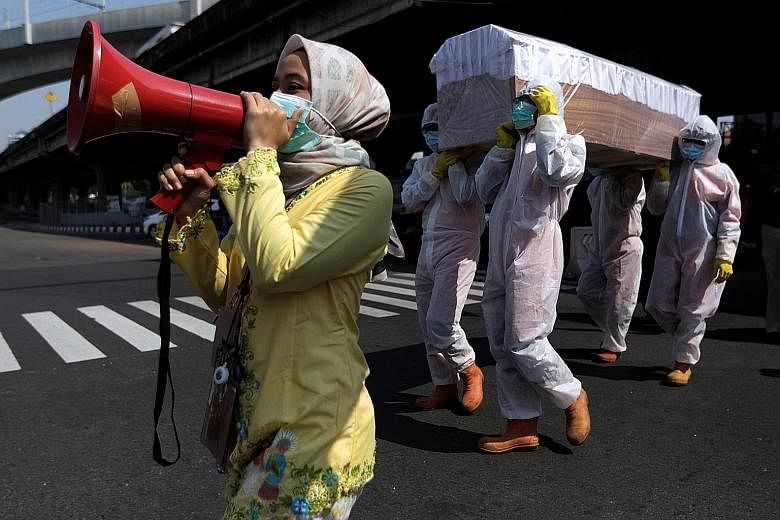A resurgence of coronavirus cases will soon put doctors at Jakarta's main hospital for Covid-19 in the position of having to decide who gets a precious intensive care unit (ICU) bed and who doesn't.
In some respects, that is already happening at the Friendship Hospital, the Indonesian capital's biggest government-run medical facility.
During a seven-day period that ended on Thursday, the hospital received requests to take an average 83 patients a day - more than double the requested referrals during the same period in July.
As the number of trained staff is limited, most requests are turned down. On Thursday, the hospital received 103 referrals and accepted only 12.
Last week, infections tested new highs, nearly six months after the first Covid-19 cases emerged.
On Friday, case numbers in Jakarta surged anew, climbing to 869, eclipsing by more than 100 the previous day's tally - itself a record. Nationally, infections soared to another record for the third successive day yesterday, with 3,308 new cases reported, taking total infections to over 169,000.
The surge has halted the capital's gradual reopening. On Thursday, Jakarta Governor Anies Baswedan shelved plans to reopen bars and nightclubs.
Professor Wiku Adisasmito, a spokesman for Indonesia's Covid-19 task force, attributed the spike in cases, at least in part, to inconsistent reporting across Indonesia's more than 300 laboratories. "The government's objectives are very clear; fast and prompt response... for all Indonesians to help create a healthy and safe Indonesia from Covid-19," he said on Friday in a virtual briefing hosted by the Jakarta Foreign Correspondents Club.
At the Friendship Hospital, or Rumah Sakit Persahabatan, doctors are grappling with the idea that they will have to triage patients - deciding whose condition is more serious yet treatable - for an ICU bed.
This is not far off, said Dr Erlina Burhan, a spokesman for the hospital who also doubles as a spokesman for the Indonesian Medical Doctor Association.
"I'm worried that soon, we will get to a point where we have to play God," she said."I'm nervous."
The Friendship Hospital, built in the 1960s with Soviet help, has become one of the capital's last lines of defence for those severely or critically ill with Covid-19 since it closed all but 206 of its 700 or so beds in March to specialise in the fight against the disease.
Two other hospitals, Sulianti Saroso and a military hospital, provide similar levels of care and have 150 beds between them.
But with its full complement of 200 pulmonary specialists, anaesthesiologists and other specialists as well as more than 100 ICU nurses, Friendship Hospital tends to take the lion's share of referrals from the capital's 64 other hospitals charged with tending to those infected by the virus.
But because beds are scarce, scores of people are turned away every day. Since July, Friendship Hospital has not accepted more than 17 referrals per day, according to hospital data.
Indonesia has four doctors per 10,000 people - half the proportion in India and less than a third the ratio in neighbouring Malaysia, according to World Bank data.
"Our biggest limitation is human resources," said Dr Ernita Akmal, an ICU anaesthesiologist at the hospital.
On close-circuit TV behind her, a nurse in protective gear tends to a critically ill patient on a ventilator in the ICU unit where all 16 beds are full.
"After six months," Dr Ernita said, "everyone is exhausted".











